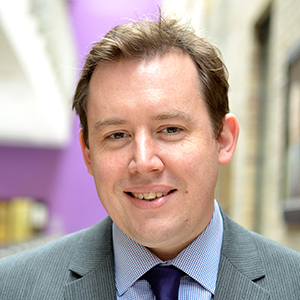Thomas Pinkney

Professor Pinkney is Director of the Birmingham Surgical Trials Consortium (BiSTC) and the Birmingham Centre for Observational and Prospective Studies (BiCOPS). He is Chair of the IBD sub-committee of Association of Coloproctology of Great Birtain and Ireland (ACPGBI) and Vice-Chair of the Research Committee of the European Society of Coloproctology (ESCP).
Tom’s research interests are predominantly in clinical and translational research in inflammatory bowel disease and surgical site infection. As a founding member of the West Midlands Research Collaborative, he maintains an interest in development of trainee-led clinical trials in surgery and beyond. He sits on the NIHR Health Technology Assessment (HTA) CET Board and until recently was deputy chair of the NIHR RfPB West Midlands Panel.
Presentations at The SoTV/EWMA 2024 Conference, London
The UK ambition for platform trials
Objectives
After attending this session, persons will be able to:
- A brief overview of the history, development and successes of Platform trials
- Understanding of range of Platform designs including Multi-Arm, Multi-Stage, Umbrella and Trials With-in Cohort designs
- Understanding of examples of Platform trials in wound care
- Update on recent NIHR funding for Platform Acceleration Awards and ambitious grant submissions
Abstract
This presentation will provide: a brief history of successful UK Platform trials (eg the COVID RECOVERY Trial and Multi-Arm, Multi-Stage trials in wound care); outline the UK ambition to enhance efficiency in trial delievry through Platform trial funding; summarise recent project success in Platform development awards in leg ulcers, surgical site infection and DFUs and; describe proposed Platform designs under funder consideration.
SUNRRISE: Incisional Negative Pressure Dressings to reduce SSI after emergency laparotomy- an RCT
Objectives
After attending this session, persons will be able to:
- To follow
Abstract
To follow
ROSSINI 2 – experiences from running a multi-arm, multi-stage SSI trial
Objectives
After attending this session, persons will be able to:
- To follow
Abstract
To follow
Presentation at The Society of Tissue Viability 2023 Conference
Reducing SSI in colorectal surgery
Objectives
After attending this session, persons will be able to:
- Understand about the impact of SSI after abdominal surgery, and the scale of the problem
- Have an awareness of shortcomings of current guidance in the reduction of SSI, and some of the challenges in trying to obtain high quality evidence in this area
- Know the results of some breaking trials in SSI
- Expore future directions in SSI research
Abstract
As of March 2023, there are 7.21 million patients waiting for planned hospital treatment within the NHS – the majority of which are elective surgical operations. The rising backlog and ongoing significant pressures on the service mean there has never been a more important time for preventable post-operative complications to be avoided.
Surgical Site Infection (SSI) is now the most common healthcare-associated infection, overtaking others such as MRSA, Clostridium difficile, hospital-acquired pneumonia and catheter-associated infections after significant and sustained investment in these other areas over recent years.
An unacceptably high proportion of patients undergoing surgery develop an SSI and as such are exposed to preventable pain, suffering, delayed further treatment and even a risk of death – the complication also costs the NHS at least £700million per year.
Colorectal surgery carries one of the highest risks of SSI of all types of surgery. Recent high-quality evidence suggests that at least 15-20% of elective colorectal operations will develop an SSI, with this rate rising to >30% after emergency surgery.
The scale of the problem has been recognised by researchers and funders alike, and a large number of trials have recently been completed in this setting. During this session the results of some new research will be presented and discussed, along with implications for our day-to-day practice.
Presentations at the WReN Scientific Meeting, Glasgow, May 2022
SSI: Challenging the established evidence with large multicentre trials – and what happens if no benefit is found
Objectives
After attending this session, persons will be able to:
- Be bought up to date on some recently breaking results from major multicentre national and international RCTs in SSI
- Explore how we might establish ‘who to believe’ when new research findings contradict current evidence or guidelines
- Discuss how and if established interventions should be dropped
Abstract
The importance of large-scale, multi-centre, pragmatic and externally valid randomised trials is increasingly recognised. Such projects have become easier to deliver recently due to the collaborative working paradigms in surgery and beyond, and the globalisation of surgical research means that what would have previously been impossible to deliver can now be realised within a realistic time frame.
In this talk, Professor Pinkney will discuss recent key findings emerging from three major multicentre trials:
SUNRRISE – Single Use Negative pRessure dressing for Reduction In Surgical site infection following Emergency laparotomy – An NIHR RfPB-funded RCT
FALCON – Pragmatic multicentre FActorial randomised controlled triaL testing measures to reduCe surgical site infection in lOw and middle income couNtries
ROSSINI 2 – Reduction Of Surgical Site Infection using several Novel Interventions – An NIHR HTA-funded multi-arm, multi-stage RCT of in-theatre interventions to reduce SSI
As is often the case when interventions are rigorously evaluated in large RCTs, the findings can challenge or contradict those of smaller-scale studies. How do we take this into consideration when there may be existing guidelines, based on the previously available evidence? Who do we believe?
The CHEETAH International Cluster RCT of glove and instrument change for wound closure to reduce SSI rates in patients undergoing abdominal surgery
Objectives
After attending this session, persons will be able to:
- Hear about this major international cluster-randomised RCT which centres on a type of behavioural change in surgeons to try and reduce SSI
- Understand when a cluster randomised trial is more appropriate than an individual patient level RCT
Abstract
Surgical site infection (SSI) represents a major burden for patients, doctors and health systems around the world, but is potentially preventable. SSI is the most common postoperative complication across all income and development settings, and the most common healthcare-associated infection in low-and middle-income countries (LMICs). It has been associated with one-third of postoperative deaths and accounts for 8% of all deaths caused by a nosocomial infection. Rates vary significantly between different types of surgery, but it is particularly prevalent in abdominal operations; as many as one in four patients get an SSI when the operation involves the bowel.
CHEETAH is an international, multicentre, 2-arm, cluster randomised controlled trial evaluating whether the practice of using separate, sterile gloves and instruments to close wounds at the end of surgery can reduce surgical site infection at 30-days post-surgery for patients undergoing clean-contaminated, contaminated or dirty abdominal surgery, compared to current routine hospital practice.
CHEETAH is being run by the NIHR Global Health Research Unit on Global Surgery which is hosted at the University of Birmingham. The trial recruitment target is a total of 12,800 participants from 64 clusters (groups of hospitals), each unit including up to 200 consecutive participants.
Getting your research funded – tips and tricks
Objectives
After attending this session, persons will be able to:
- Hear from a member of the NIHR HTA and RfPB funding panels about how to increase your chances of a successful funding application
- Common ‘red flags’ for funding committees and how to avoid them
Abstract
There is no doubt that getting the most difficult research grant to get funded is your first one. With experience of the system, and a track record of successful delivery, the following grants get easier. There are standard mistakes which seen time and again on funding boards, which are easily avoidable. In this talk, Professor Pinkney will cover the key tips and tricks to make your project appeal to the reviewers and board, and show how to avoid those torpedos which can result in hours of wasted effort and frustrating disappointment.














